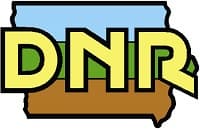Iowa Reminds Waterfowl Hunters to Stop Aquatic Invasive Species
Iowa Department of Natural Resources 10.09.13

Waterfowl hunters using boats to reach their hunting location are reminded that they have new laws to follow that are designed to protect Iowa lakes, rivers, and wetlands from the spread of aquatic invasive species.
“Hunters are legally required to drain all water and remove plants and aquatic invasive species from boats and equipment before leaving a water access,” said Kim Bogenschutz, Iowa DNR Aquatic Invasive Species Program Coordinator. “Drain plugs need to remain removed or opened during transport.”
Duck hunting season opens in the north zone on Oct. 12, in the south zone on Oct. 19 and in the Missouri River zone on Oct. 26.
Boats can be carrying aquatic vegetation inside the boat and/or hanging on the trailer. Aquatic invasive species such as Eurasian watermilfoil, purple loosestrife, and brittle naiad could be among the vegetation on a boat, decoys, or blind. Zebra mussels could also be attached to aquatic vegetation or equipment or in equipment holding water.
These species could be unintentionally transported if waterfowl hunters do not take the proper precautions to prevent their spread.
Aquatic plants can be used for construction and during transport of a shooting blind as long as there are no aquatic invasive species present in the blind and the aquatic plants used are emergent species (such as cattails) cut above the waterline and contain no seed heads, roots, or rhizomes.
Hunters should follow a simple set of procedures each time when leaving the water to avoid carrying unwanted hitchhikers.
- CLEAN any plants, mud, or debris from boat, decoys, waders, and other equipment before leaving a water body.
- DRAIN water from all equipment (boat, motor, bilge, hunting gear, decoys) before leaving a water body.
- DRY anything that comes into contact with water (boats, trailers, decoys, boots, dogs). Before transporting to another water body either: Spray your boat and equipment with hot, high-pressure water; or Dry your boat and equipment for at least five days.

